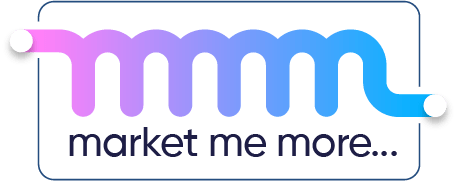How to Build a Resilient Career, Wealth & Brand in Uncertain Times
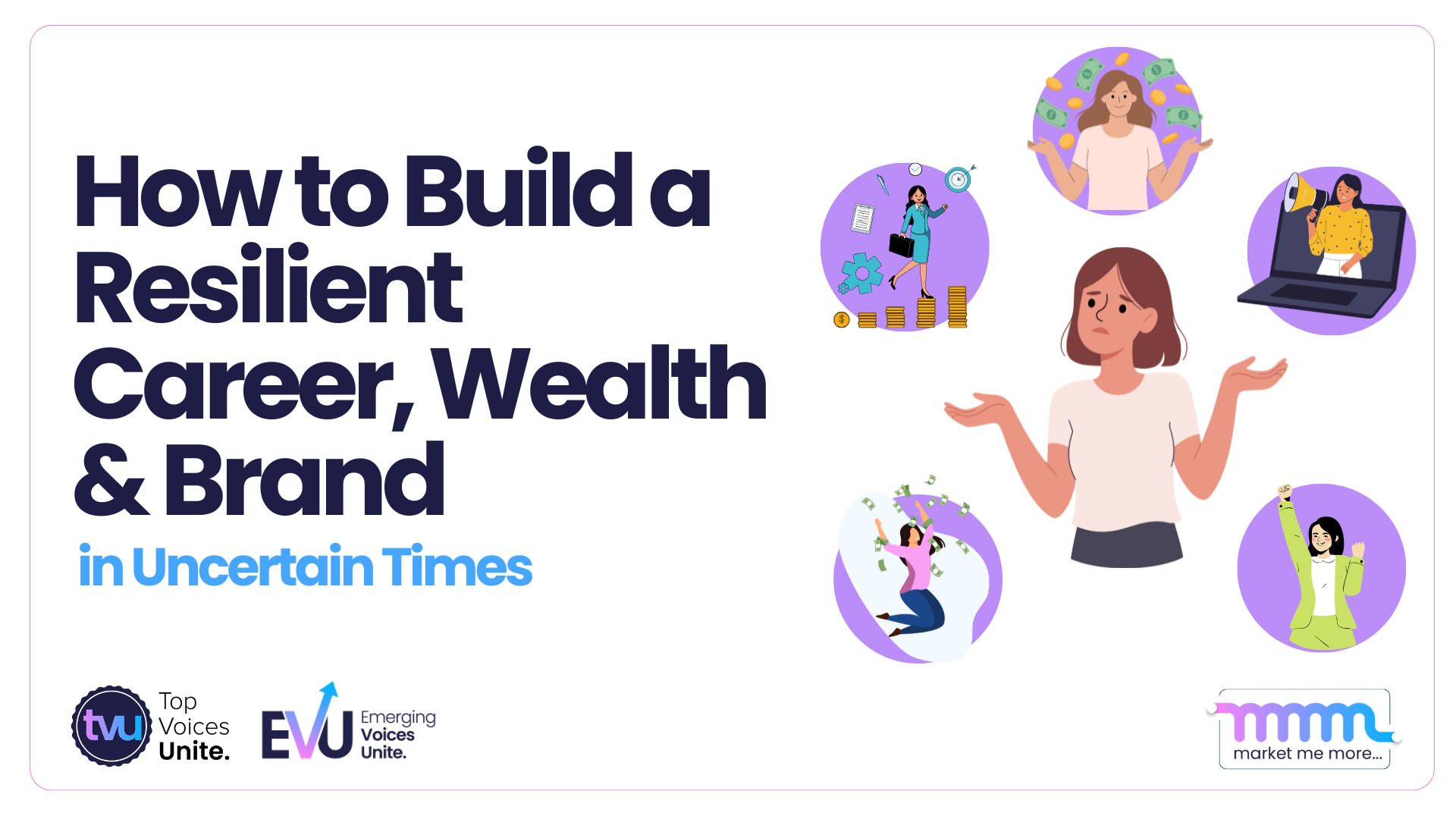
What do mastering economic uncertainty, building a values-driven business, and designing natural CTAs have in common?
They’re all part of this week’s bold conversations from Top Voices, where industry leaders, financial experts, and entrepreneurs share their strategies for navigating today’s challenges with clarity and purpose. From preparing for inflationary pressures to leading with vulnerability and building community-driven marketing, these insights will help you build a resilient mindset, grow your influence, and plan for a future with confidence.
Whether you're navigating career transitions, fine-tuning your leadership skills, or rethinking your marketing approach, these actionable takeaways will guide you toward long-term success.
How to Prepare for Economic Uncertainty: Insights from Andy Wang
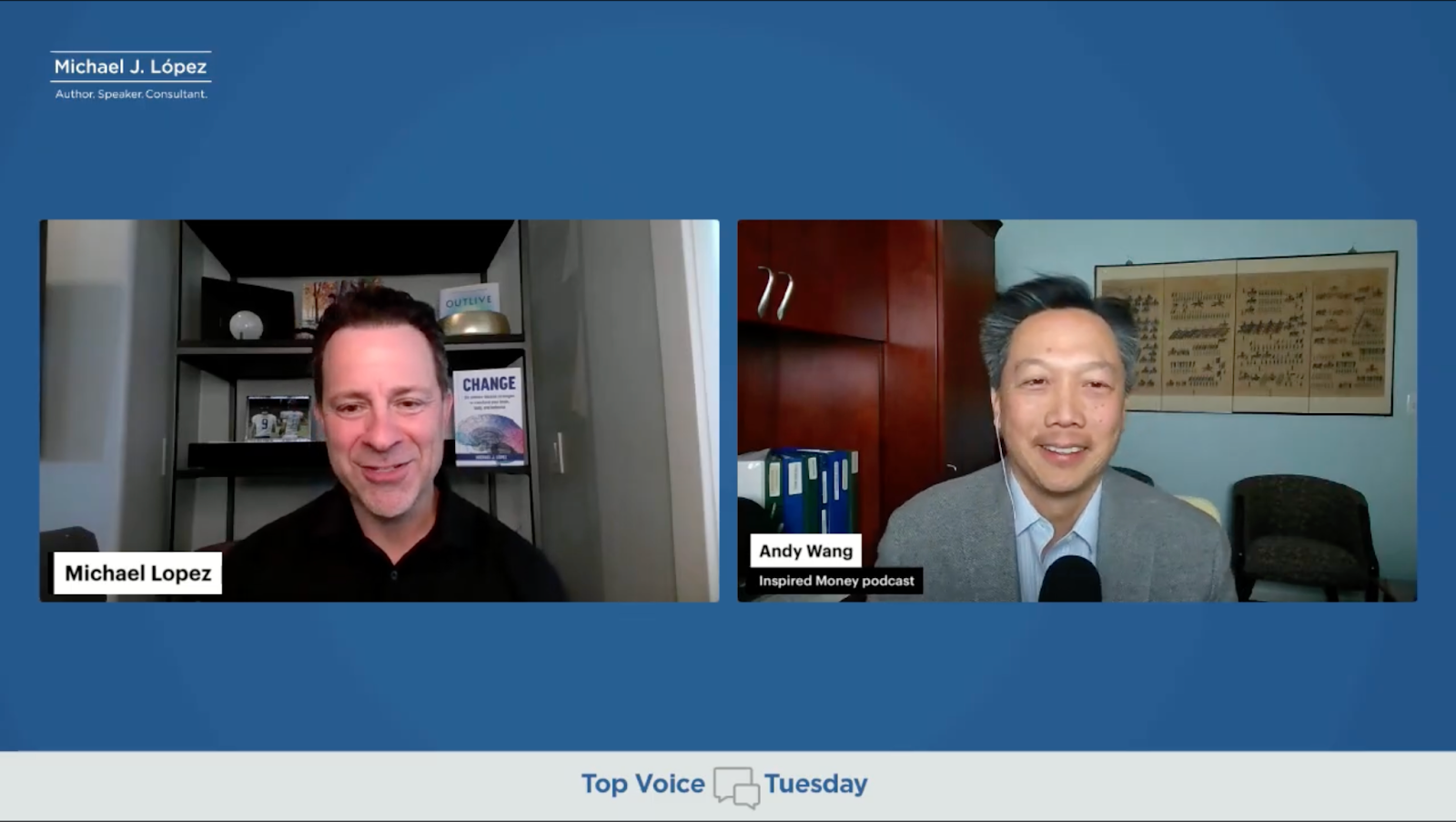
In a recent conversation, Michael Lopez welcomed Andy Wang, Founder & CEO of Runnymede Capital Management, Inc., to discuss strategies for navigating economic uncertainty and how it impacts financial planning. With inflation on the rise and markets in flux, Andy shared actionable insights for building wealth, ensuring long-term financial stability, and adjusting retirement plans to thrive in uncertain times.
This discussion went beyond survival—it’s about strategically positioning yourself to capitalize on opportunity, even in the face of economic challenges. Whether you’re looking to make sound investments or rethink your retirement plan, Andy’s advice provides the foundation for long-term financial health.
Here are 4 Key Takeaways from Andy’s expert insights:
4 Key Financial Strategies to Navigate Economic Uncertainty
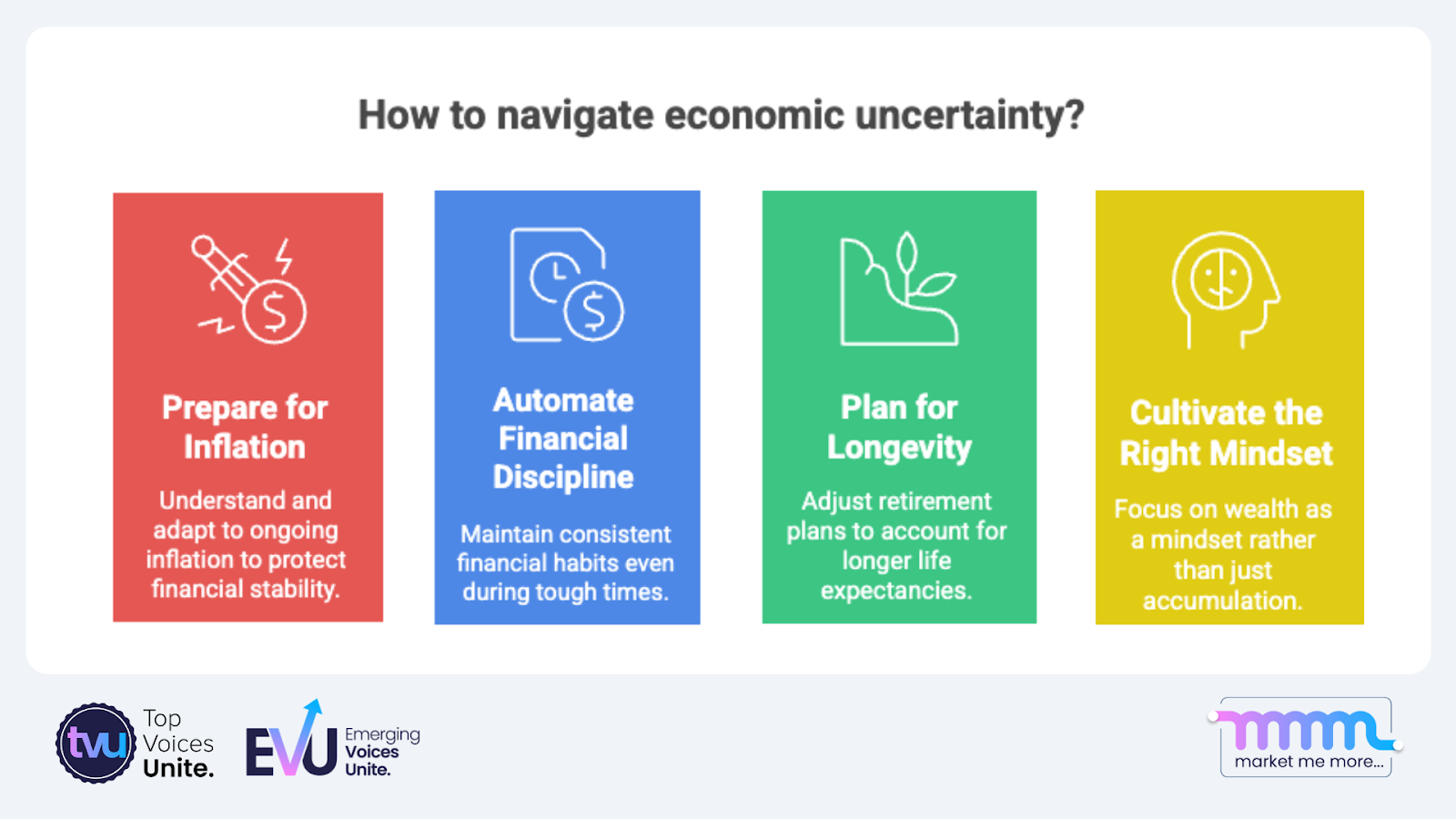
1. Inflation Is Here to Stay But You Can Prepare
“Inflation management starts with owning real assets and staying cost-conscious. We’re not just talking about interest rates or tariffs; it’s about controlling what we can control.” — Andy Wang
Andy emphasized the importance of adjusting to inflationary environments, especially after inflation peaked at 9% in 2022. He suggests focusing on real assets like property or commodities, which often appreciate faster than cash during inflationary periods. The Harvard Joint Center for Housing Studies has shown that multifamily housing has held its ground during economic downturns, serving as a resilient hedge against inflation.
Learn more about inflation’s impact on investment strategies: Sage Inflation Study
2. Automate Your Financial Discipline Even When Times Are Tough
“Automate your saving and investing so that even on your worst day, progress continues without needing willpower.” — Andy Wang
Financial discipline is key to survival during inflationary pressures. Andy suggests automating savings and retirement contributions to ensure that wealth-building happens consistently—regardless of market ups and downs.
Forbes outlines how automated savings programs have significantly helped investors weather volatile markets.
3. The Retirement Landscape Is Changing—Plan for Longevity, Not Just Years
“Retirement today isn’t binary—people are finding new ways to stay engaged after leaving traditional work.” — Andy Wang
Andy highlighted the importance of planning for a retirement that could last 30 years or more. With rising life expectancy and evolving career patterns, people are opting for phased retirements that include consulting or second careers.
MarketWatch discusses the changing nature of retirement and how traditional plans may no longer be sufficient.
4. Wealth Isn’t Just About Accumulation—It’s About the Right Mindset
“The biggest regret retirees have is not what they didn’t earn—it’s the relationships they didn’t nurture.” — Andy Wang
Andy stressed that mindset and consistent behavior are more crucial for long-term wealth than market predictions or income levels. Living below your means and focusing on delayed gratification often leads to financial freedom.
Read how mindset can impact financial outcomes: The Power of Delayed Gratification by Harvard Business Review
Knowledge Impact & Final Thoughts
This conversation wasn’t just about navigating inflation and market shifts—it was about planning for an uncertain future with confidence. Andy’s insights urge us to rethink financial strategy, moving away from short-term fixes to long-term, flexible approaches. When markets are unpredictable, financial discipline, automation, and aligning your money with personal values become your best strategies. Whether you’re building wealth or transitioning to retirement, Andy’s advice on flexibility and focus is invaluable.
“It’s not about how much you earn—it’s about how you align your finances with what truly matters.”
What To Do Next
📺 Watch the Full Episode of “Economic Uncertainty and The Future of Financial Planning”
- In YouTube:
Connect with speakers:
- Follow Andy Wang for sharp insights on financial planning, economic resilience, and wealth-building strategies in uncertain times.
- Access the free financial planning tool by visiting: Inspired Money FM
How to Navigate Career Transitions Like a Pro: 5 Key Takeaways from Dominic Imwalle
On October 21, 2025, Michael Lopez hosted a thought-provoking Top Voices Tuesday conversation with Dominic Imwalle, a rising Top Voice and Big Four consultant turned entrepreneur. Dominic shared his journey of transitioning from a secure corporate role at Deloitte to launching his own coaching business. In this episode, he gave valuable insights into the emotional and professional aspects of career shifts, offering advice on how to overcome fear, build resilience, and find true purpose in your work.
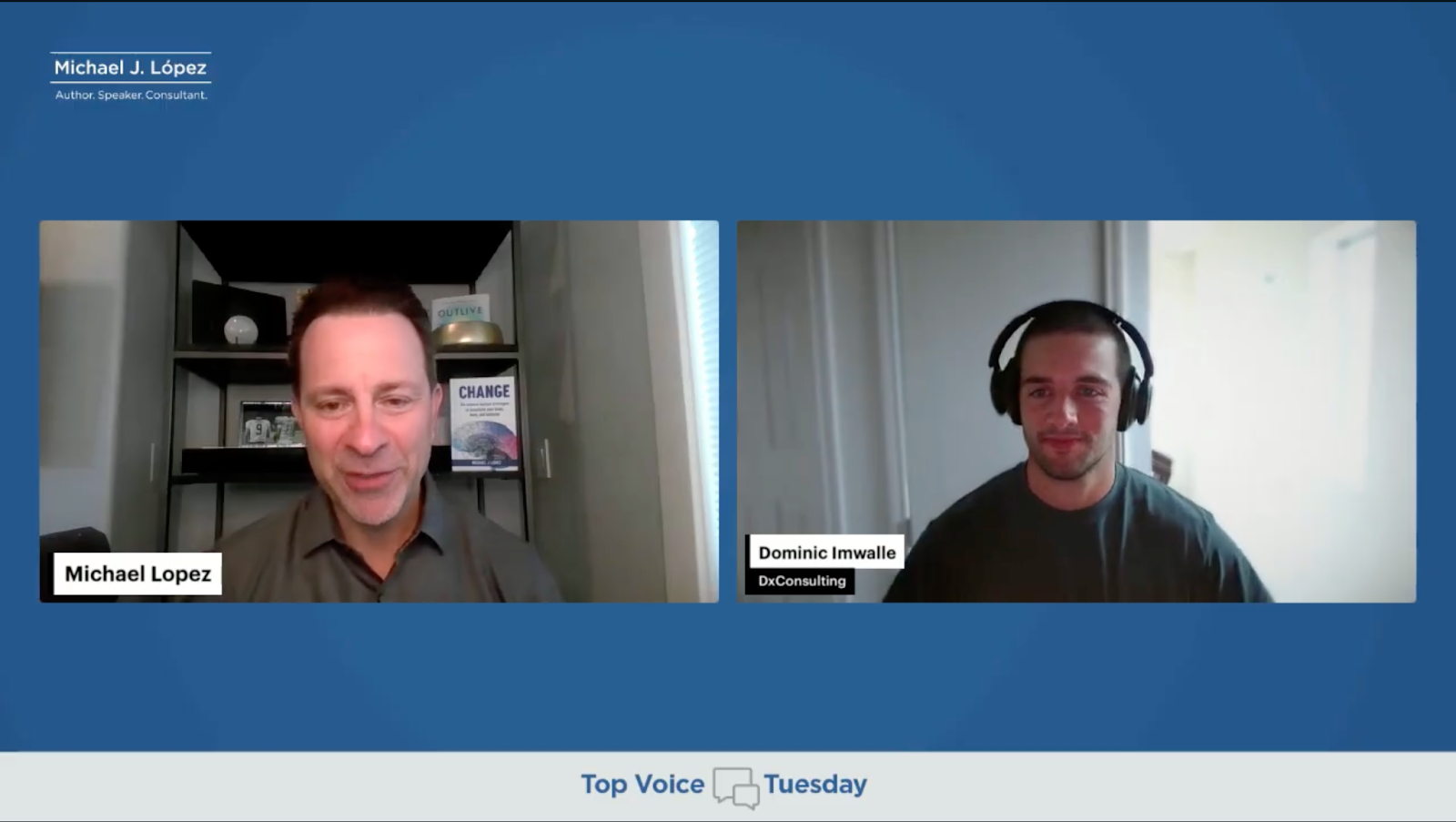
5 Lessons to Master Career Transitions and Entrepreneurship
1. How to Know When It’s Time to Transition from Corporate to Entrepreneurship
“You can’t discredit the first two or three years, but eventually, it just starts to eat away at you. You want to wake up every single day, obsess over something you love.” — Dominic Imwalle
Dominic describes his decision to leave a high-paying corporate job at Deloitte as a result of a deep inner desire for growth and purpose beyond the rigid corporate path. It took him three years of balancing both the corporate job and side hustle before he felt the financial security to make the leap.
Read more on career transitions from the MarketMeMore blog: How to Think Strategically About a Career Transition
2. How to Overcome the Fear of Entrepreneurship
“It’s not going to be pretty all the time, but it’s about embracing those difficult early days and knowing that the struggle is part of the journey.” — Dominic Imwalle
Dominic shared the highs and lows of his first few weeks as an entrepreneur. He emphasizes mental resilience and community support as critical factors for overcoming the emotional realities of entrepreneurship.
MarketWatch shares strategies for managing the emotional side of entrepreneurship: Managing the Emotional Ups and Downs of Entrepreneurship
3. What It Takes to Build a Values-Driven Business
“I refuse to work with clients who don’t respect my values. Building a business based on values leads to more authentic, sustainable relationships.” — Dominic Imwalle
Dominic’s journey into entrepreneurship wasn’t just about money—it was about aligning his business with his personal values. He stressed the importance of choosing clients and opportunities that align with your core beliefs, ensuring long-term success.
Read about building values-based business models: 5 Power Plays: Turn These Top Voices Insights into Real Business Momentum
4. The Power of Networking and Community in Career Transitions
“You can’t do this alone. You need to surround yourself with mentors, peers, and a community that supports you.” — Dominic Imwalle
Dominic emphasized that networking and community engagement played an essential role in his transition. He actively participated in job seeker meetups, panels, and volunteered locally to stay connected and receive market feedback.
Entrepreneur outlines how to build a strong professional network: How Networking Can Drive Your Career Transition

5. How to Embrace and Learn from Failure During Career Shift
“Enjoying the process, even the tough parts, is the key to navigating career transitions. You’ve got to enjoy the struggle to come out successful on the other side.” — Dominic Imwalle
Dominic’s story serves as a reminder that failure is not the end but a valuable part of the learning process. Whether it's career rejection or business setbacks, embracing failure and learning from it is essential to growing as an entrepreneur.
Lolly Daskal offers insights into how to learn from failure: 7 Powerful Ways to Turn Every Failure Into Success
Why Career Transitions Aren’t Just About Changing Jobs—They’re About Building a New Life
Dominic Imwalle’s conversation with Michael wasn’t just about leaving the corporate world to become an entrepreneur—it was about redefining what success looks like. His message encourages professionals to align their careers with personal values, leverage their networks, and embrace resilience as they navigate change. Dominic’s story proves that embracing challenges, whether in a corporate setting or as an entrepreneur, is the key to long-term success.
“The greatest success doesn’t come from just changing jobs, it comes from changing your entire approach to life.” — Dominic Imwalle
What’s Next?
📺 Catch the full episode on-demand: Conversations with My Former Self: Navigating Career Transitions
- In YouTube:
Connect with speakers:
- Check out Dominic Imwalle’s LinkedIn for valuable insights on career transitions, entrepreneurship, and building a values-driven business.
Join the next episode of Top Voice Tuesday with Tim Dickey on October 28 at 12:00 PM EST on LinkedIn Live. Register here!
📬 Get the most of the insights from our featured Top Voices in this episode!
- Learn from Michael’s latest thinking on change and transformation, along with current topics discussed on the Top Voice Tuesday Podcast and subscribe.
https://www.michaeljlopez.coach/weekly-newsletter-sign-up
The Psychology of the Click: Designing CTAs That Feel Natural
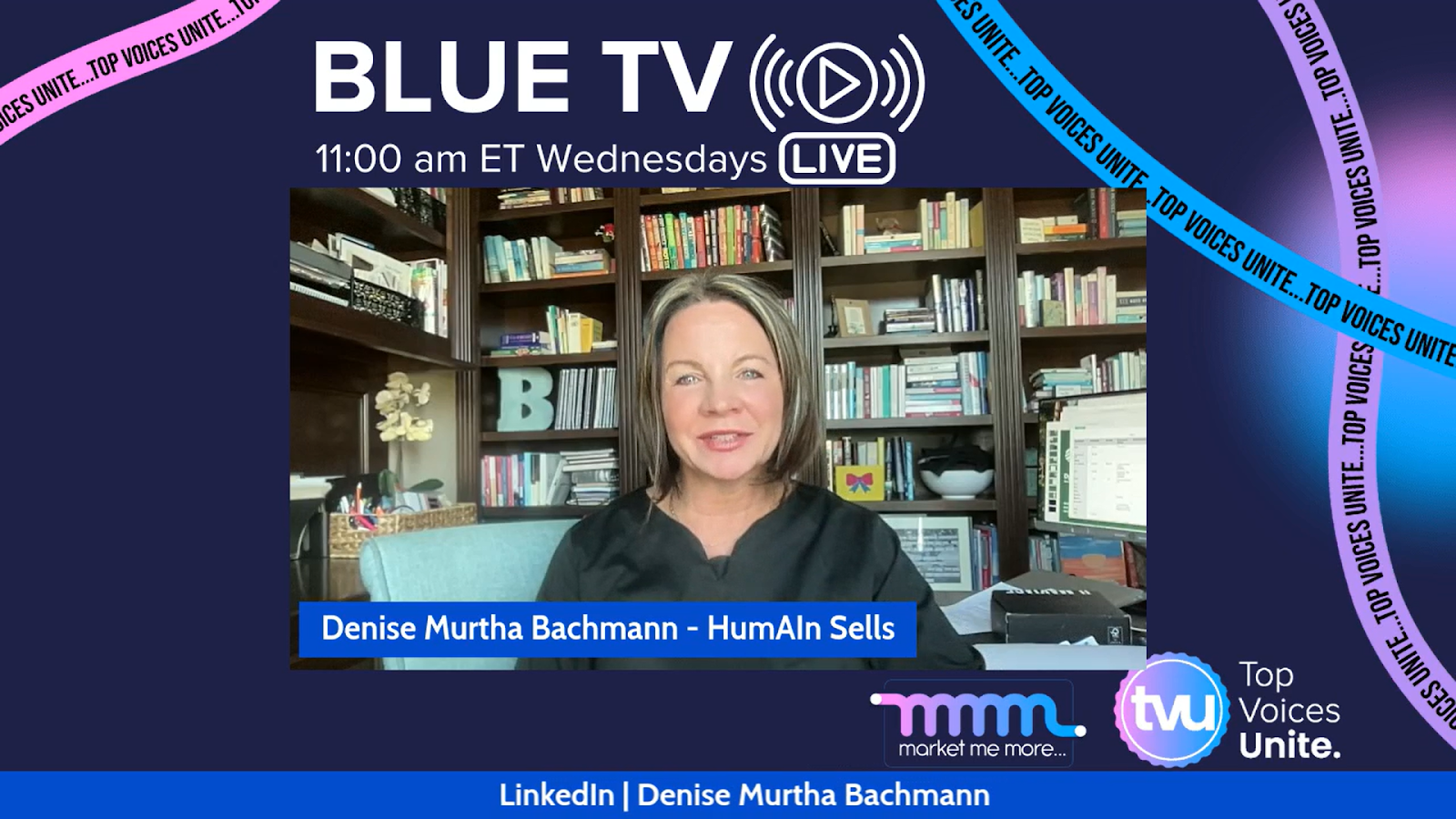
Those quiet readers who see your posts but never click or comment? They’re often the ones closest to taking action.
In this week’s Blue TV, LinkedIn Top Voice and Sellovatorz, Inc. founder Denise Murtha Bachmann revealed why the most effective CTAs aren’t commands—they’re invitations. Harsh “Click now” or “Buy this” messages create friction, while softer, conversational CTAs build trust and open the door to long-term relationships.
“Think of a CTA like inviting someone to dance—it should flow with the rhythm of the conversation.” — Denise Murtha Bachmann
This episode focuses on how to make your CTAs sound human, align with audience readiness, and engage the silent followers who make up most of your potential buyers.
4 Ways to Make CTAs Feel Natural (and Convert Better)
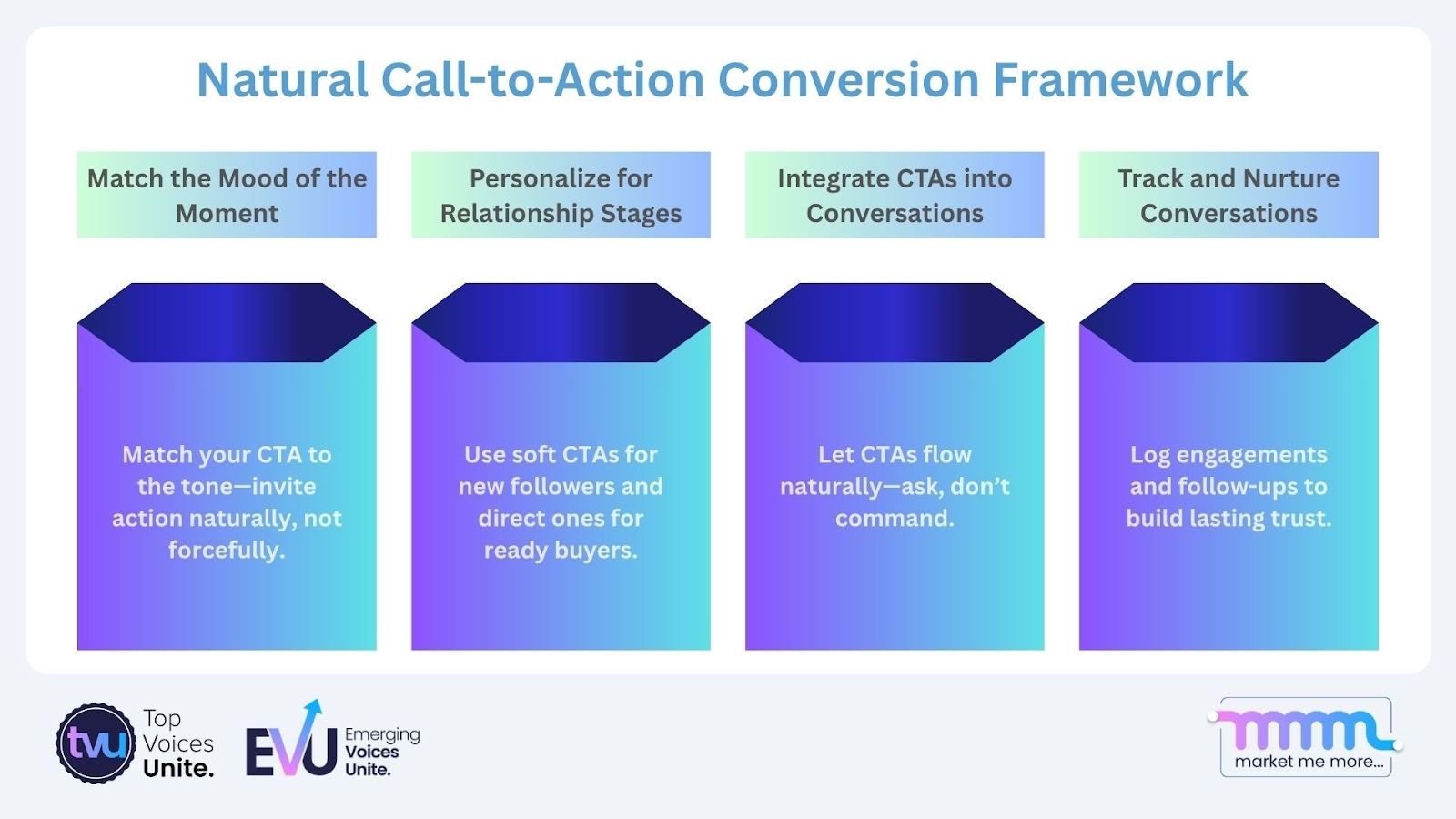
- Match the Mood of the Moment Your CTA should fit the tone of your content. If your post inspires, invite readers to take an uplifting next step—don’t break the flow with a hard sell.
- Personalize for Relationship Stages For new followers, try low-pressure invites like “Save this post” or “Follow for more.” For warmer leads, try “DM me if this resonates.” For ready buyers, add a link to book a call or download a guide.
- Integrate CTAs into Conversations CTAs should feel like a natural extension of your post, not an abrupt command. Replace “Comment below” with “Have you experienced this too?” to start genuine dialogue.
- Track and Nurture Conversations Keep notes on who engages or responds in your DMs. Use spreadsheets, Sales Navigator, or even a notebook to track names, topics, and follow-ups—personalization builds trust.
💡 Stat to Know
LinkedIn direct messages (DMs) boast an average reply rate of 10.3%, more than double that of cold emails, which average 5.1%. (Expandi.io)
✅ What You Can Do Now
- Revisit your last post and rewrite your CTA to sound like a friendly invitation.
- Edit older posts to include conversational CTAs that encourage dialogue.
- Drop an emoji in the comments to receive Denise’s list of 10 CTAs that convert without pressure.
- Track your DM conversations to personalize future outreach and build stronger relationships.
Replay + Resources
📺 Replay the Full Episode: The Psychology of the Click: Designing CTAs That Feel Natural
- Youtube Replay: The Psychology of the Click: Designing CTAs That Feel Natural
🔷 Learn more from Denise Murtha Bachmann 🔗 Sellovatorz 🔷 Book a 1:1 Sales Strategy Call with Denise →Scheduling link
How to Master Leadership and Achieve Financial Success: 5 Key Insights from the Experts
Last October 23, 2025, the Inspired Money podcast hosted a powerful conversation on leadership, financial success, and personal growth, featuring Charlene Wheeless, MA, MBA, ICF-ACC, a leadership strategist and bestselling author; Tiffany A. Yu, MSc, the CEO of Diversability; and 💜Heather R Younger, J.D., CSP®, the Founder of Employee Fanatix. Moderated by Andy Wang, this session offered a deep dive into leadership transformation—how authenticity, vulnerability, and emotional intelligence are shaping the leaders of tomorrow. The discussion was filled with actionable insights for current and aspiring leaders in any field.
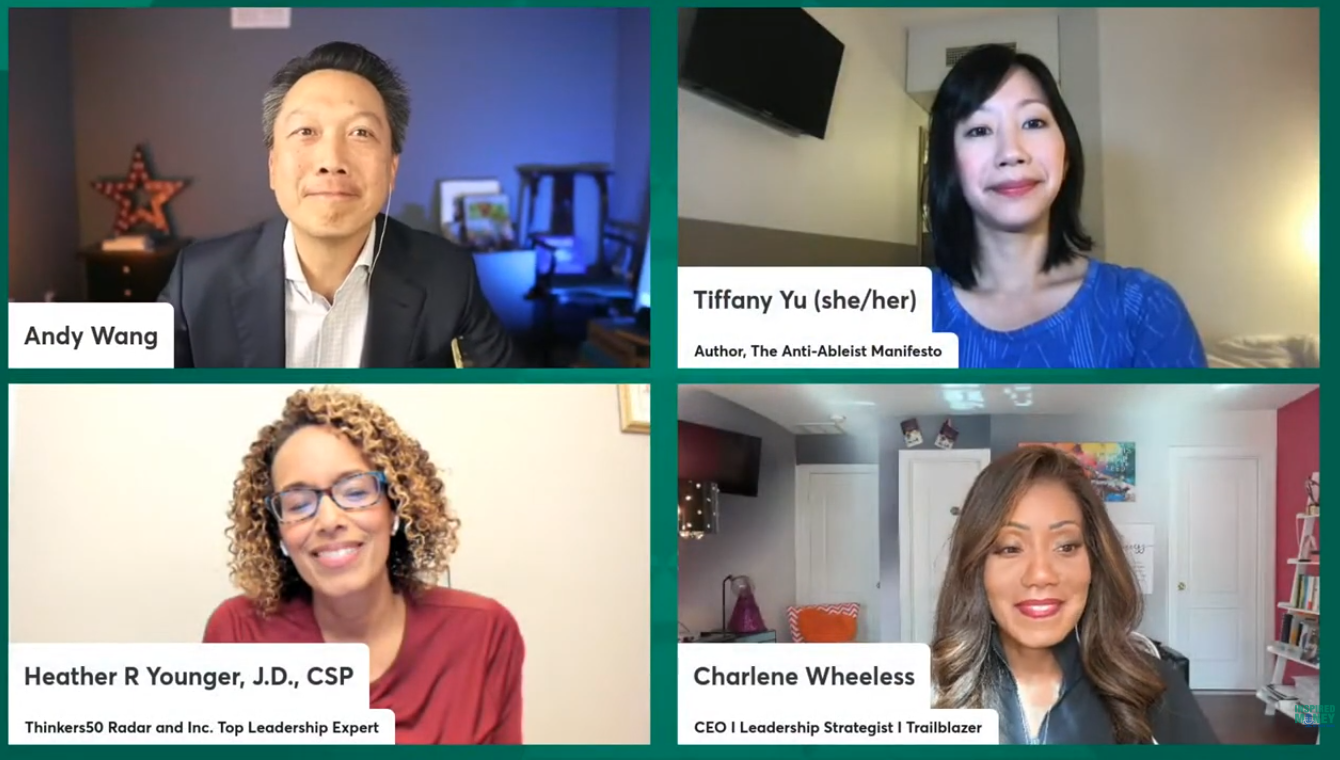
Before You Lead, Understand the People You’re Leading
This episode unpacked the transformative power of self-leadership, active listening, and emotional intelligence in fostering high-performing teams. Whether you're a seasoned executive or an emerging leader, mastering these traits is essential for career growth and financial success.
Here are the five critical insights that can help you lead with purpose, empathy, and authenticity:
5 Leadership Secrets for Financial and Personal Growth
1. Leadership Is About Alignment with Values
“Good leadership is about being aligned with your values, and those don’t change when your environment changes.” — Charlene Wheeless, MA, MBA, ICF-ACC
Charlene emphasizes that effective leaders stay grounded in their core values, which doesn’t change regardless of the environment. Leaders who adapt their style without compromising their values build trust and lead with authenticity.
This perspective resonates with findings in leadership theory, as noted in the Harvard Business Review, where authentic leadership is shown to drive long-term success.
2. Vulnerability Is a Strength, Not a Weakness
“I learned the power and strength of being a vulnerable leader rather than a perfect leader.” — Charlene Wheeless, MA, MBA, ICF-ACC
Charlene's experience highlights how vulnerability can create deeper connections and stronger leadership, especially when facing adversity. By sharing personal challenges, leaders demonstrate resilience and humanize their leadership, which fosters trust and respect.
This idea aligns with Brene Brown’s book on vulnerability as a core component of courageous leadership.
3. The Power of Listening: True Leadership Starts with Empathy
Heather emphasizes the importance of empathetic listening, highlighting that leaders who actively listen—not just to words, but to emotions and unspoken concerns—can create a safe and inclusive environment.
This deep listening fosters trust and enables leaders to make informed, compassionate decisions. Research supports that companies with empathetic leaders report higher employee satisfaction and retention rates.
Read more on empathetic leadership: https://www.ccl.org/articles/leading-effectively-articles/empathy-in-the-workplace-a-tool-for-effective-leadership/
4. Building Psychological Safety with Radical Candor
“Leaders should model vulnerability and admit mistakes publicly, encouraging a culture of psychological safety.” — Tiffany A. Yu, MSc
Tiffany’s focus on creating an environment where people feel safe to voice their opinions, ask questions, and admit mistakes is critical for fostering innovation.
Leaders who promote psychological safety enable their teams to perform at their best. This aligns with research on high-performance teams that thrive in environments where feedback and trust are nurtured.
Learn more about psychological safety in leadership: https://www.ccl.org/articles/leading-effectively-articles/what-is-psychological-safety-at-work/
5. Integrity Builds Trust and Drives Performance
“Integrity isn’t just a personal virtue; it’s a strategic asset that helps build trust and strengthens organizations.” — Charlene Wheeless
Integrity is the bedrock of strong leadership. Leaders who act with integrity create transparent, trust-based relationships, which results in greater collaboration, decision-making, and organizational loyalty.
According to Forbes, organizations known for ethical leadership outperform their competitors, creating a culture that attracts talent and strengthens stakeholder relationships.
What’s Next?
🎧 Catch the full episode on-demand and share it with someone who needs to hear it.
🎙️ Listen to past episodes of Inspired Money Podcast in different platforms here: Inspired Money with Andy Wang
✉️ Subscribe to Andy's email newsletter for investment insights: https://www.runnymede.com/newsletter
🔎 Explore more from our Inspired Money host and guest speakers in this episode!
- Andy Wang to explore more insights and opportunity for the podcast
Company Website: Runnymede Capital Management
- Charlene Wheeless – Discover leadership strategies, authenticity in leadership, and more from Charlene’s website and book You Are Enough.
Personal Website: https://charlenewheeless.com
- Tiffany Yu – Dive deeper into disability inclusion and leadership with Tiffany's The Anti-Ableist Manifesto.
Personal Website: https://tiffanyyu.com
- Heather Younger – Learn about employee engagement, leadership, and empathy from Heather's consulting firm, Employee Fanatix.
Personal Website: https://heatheryounger.com
How to Leverage Community-Led Growth for Modern Marketing Success
Nikki Estes hosted an insightful episode of Voices of the Week, last October 23, 2025 focusing on the lessons from Columbus Day and its relevance to modern marketing. In this session, Nikki Estes shared how the spirit of exploration, collaboration, and community-building can help businesses thrive today, just as it did in history.
This episode explored how community-led growth has become a critical strategy for businesses in the digital age, helping them build trust, enhance customer engagement, and foster long-term relationships. Drawing parallels between Columbus’s historical journey and today’s market explorers, Nikki emphasized the importance of community in shaping sustainable business growth.
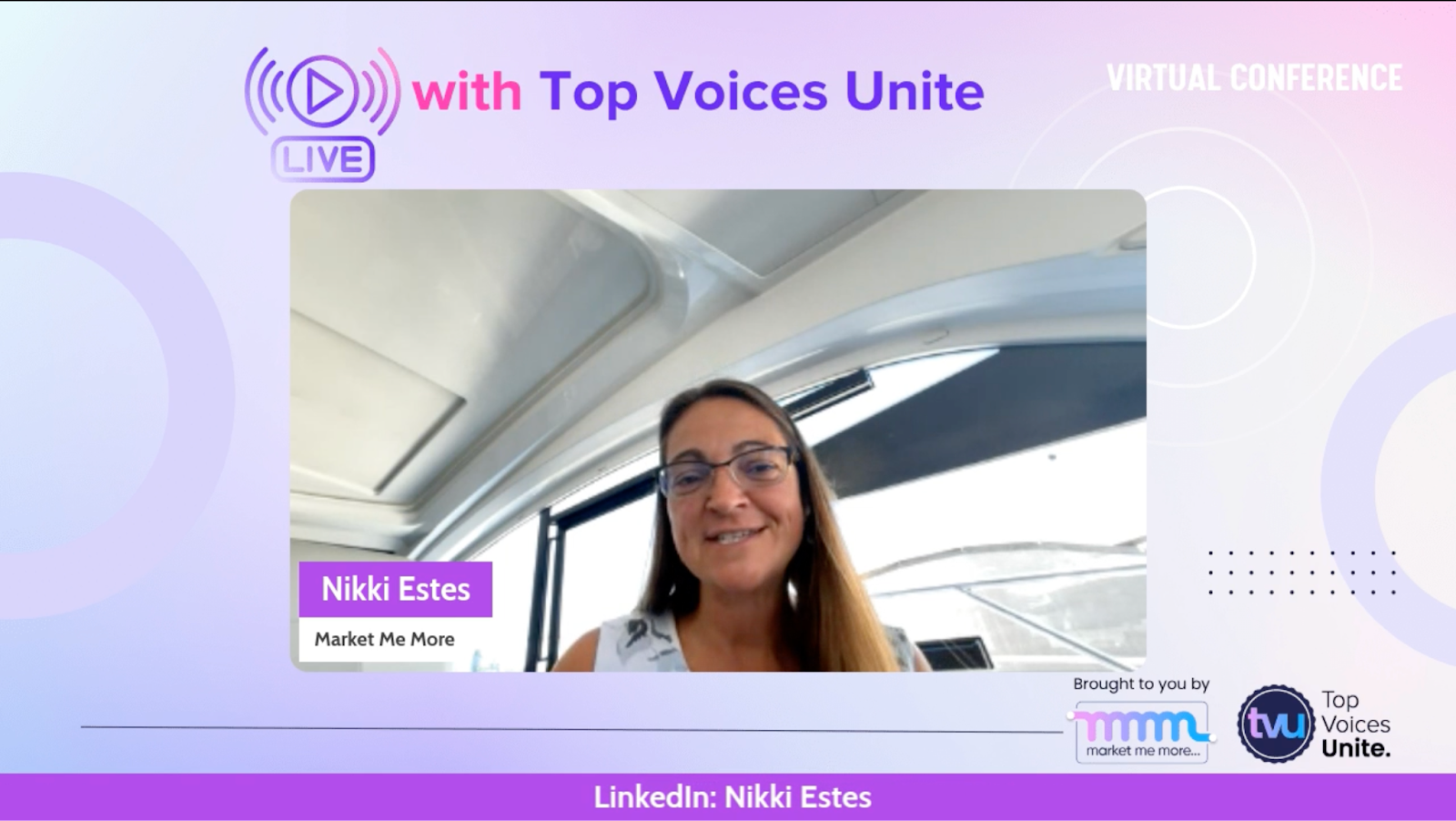
4 Principles to Transform Your Marketing Strategy Using Community Engagement
1. How to Build a Resilient Brand Through Shared Purpose
“Every community needs a reason to gather. Is it for business, is it for philanthropy, or is it for an event?” — Nikki Estes
Nikki explained that the first step in community-led growth is creating a shared purpose that unites your community around common goals. This approach fosters trust and encourages deeper engagement. By establishing a sense of collective mission, businesses can create strong, lasting connections with their audience.
🔗 Explore more on creating a shared purpose for community growth here in Market Me More Blog
2. Why Co-Creation Drives Engagement and Builds Long-Term Value
“Allowing members to teach, share, and lead helps foster an environment of growth and shared knowledge.” — Nikki Estes
The second principle Nikki shared was co-creating content with community members. This approach not only empowers the community but also fuels collaboration and innovation. When people contribute their expertise, it builds a sense of ownership and strengthens the relationship between brand and audience.
Discover how co-creation can drive business growth
3. How to Measure Community Success Beyond Conversions
“Growth belongs to the brand resilience and the reputation. It’s about testing your brand’s ability to bounce back and engage over time.” — Nikki Estes
Nikki introduced the idea that successful community-led marketing doesn’t just measure sales conversions—it focuses on brand resilience and reputation. By building community trust and measuring engagement beyond simple metrics like sales, businesses can create a sustainable, long-term strategy for growth.
Read more about measuring community engagement and resilience: Urban Footprint on Community Resilience
4. How to Plan Events that Build Community and Drive Engagement
“You don’t put on an event just to sell something. You put on an event to create connections, to make a lasting impact.” — Nikki Estes
Events are a powerful tool for fostering community engagement. Nikki discussed the importance of planning strategic events with clear missions that serve the community’s needs.
By involving active explorers instead of passive spectators, businesses can increase interaction and ensure their events are not only memorable but also effective in driving long-term relationships.
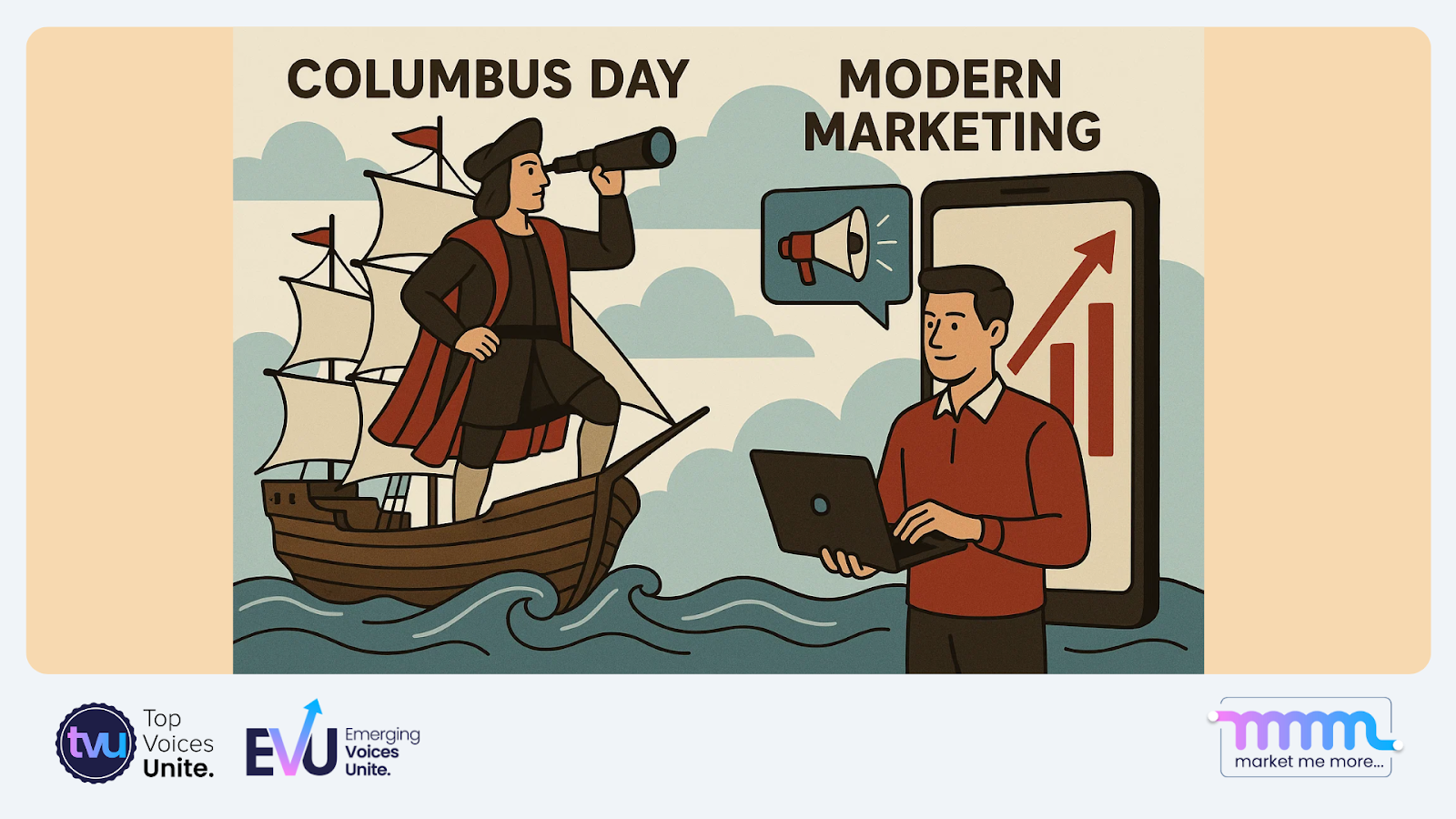
Why Modern Marketing Is All About Community Engagement
Nikki’s conversation highlighted that community-driven growth is no longer just a strategy—it’s essential for businesses to thrive in the modern marketing landscape. Much like Columbus built his journey by bringing together diverse groups of people, today’s businesses must foster collaboration and trust within their communities to succeed. This approach creates deeper, more meaningful connections that drive not just short-term results but sustainable, long-term growth.
“Exploration in business is about building bridges, not borders.” — Nikki Estes
Whether you're building a brand, launching an event, or simply looking to create stronger relationships with your audience, community-led growth will always be your compass.
📍 What To Do Next
📺 Catch the full Live with Top Voices Unite episode here: Voices of the Week: What Columbus Day Reveals About Modern Marketing
Explore more from our Voices of the Week host and guest speaker in this episode!
- Connect with Nikki Estes CEO of Market Me More and founder of Top Voices Unite and Emerging Voices Unite, helping leaders navigate AI, generational shifts, and visibility with integrity.
🗞️ Subscribe for More to get behind-the-scenes leadership insights and community updates from Nikki Estes, Top Voices, Emerging Voices and the Market Me More team.
